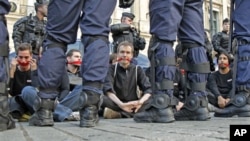The Arab Spring appears not to have sprung into sub-Saharan Africa, where journalists face increasing repression while trying to cover anti-government protests.
In its 2011-2012 Worldwide Press Freedom Index, Reporters Without Borders cites Angola, Uganda and Malawi as cases in point. The group also ranked Eritrea as the worst country for press freedom in the world. However, not all the news from the group was bad.
Cape Verde, off of Africa’s west coast, is the highest ranking non-European country in the press freedom index, coming in at number nine. And the southern African nation of Namibia ranked 20th in the world, ahead of countries like Japan and Britain.
Mali, Ghana, Botswana, and Comoros also are doing well, having made the top 50 list. And Botswana and Comoros rose 20 and 25 places, respectively, from last year.
Reporters Without Borders Africa desk head Ambroise Pierre applauds these developments.
“It shows that a few countries in Africa are able to be an example for the others. It shows also that violence against the press or censorship is something you can avoid in Africa,” said Pierre.
In sharp contrast is the Horn of Africa country of Eritrea, which ranked 179, last in the world, for the fifth year running. In the words of Reporters Without Borders, “freedom of opinion, like all the other freedoms, does not exist under the totalitarian dictatorship that President Isaias Afewerki has imposed.” The group's report notes that at least 30 journalists are being detained in appalling conditions, some being behind bars for more than a decade.
Eritrean presidential spokesman Yemane Gebremeskel blasts Reporters Without Borders for being, as he said, one-sided, saying that researchers have never come to Eritrea, interviewed government officials, or verified independently reports of abuse against journalists.
“We have media people who operate freely. In this country, nobody is detained for the views he or she holds. Everybody is entitled to his own opinion. That is not the affair of the government,” said Gebremeskel.
Not much better is Somalia, where an intense civil war between the transitional government and the militant group al-Shabab even makes leaving the house potentially deadly.
“Sometimes, when you go to al-Shabab, the government police may think that you have links with al-Shabab," said Feisal Omar, a freelance photographer who files for several international news agencies. "And, if you go to the presidential palace the following day for a [press] conference, al-Shabab may think that you’re working closely with the government. They are potentially wanted people, journalists. And, there are unexpected explosions - grenades or roadside bombs - as you move daily. So you don’t know whether you come back home safely or not.”
According to the Reporters Without Borders report, scores of journalists were arrested and mistreated last year as they covered anti-government protests in Angola, Uganda, and Malawi. The report notes that Malawi’s ranking plunged 67 places, the biggest fall of any country in the world, and says that increasingly repressive media legislation had caused some European donors to suspend part of their aid.
Reporters Without Borders’ Pierre said one of the most noteworthy findings in sub-Saharan Africa is that the gap between the good and bad performers is so huge and growing.
“Some of them are even really enemies of the press, like Eritrea or Sudan, but some countries really show the example. At the other end of the index, the countries that performed well are doing better and better, and they show that African countries can do well in terms of respect for fundamental freedoms,” said Pierre.
The Paris-based watchdog’s Worldwide Press Freedom Index is an annual measure of the degree of freedom that journalists and news agencies enjoy in each country, and efforts made by governments to ensure and protect freedom of expression. The more than 50 criteria to assess press freedom include violations such as murder, assault, threats, censorship, confiscation of material, and others, as well as impunity for these violations. Armed militias, pressure groups, and other organizations are taken into account, in addition to governments.




